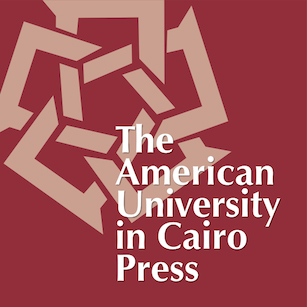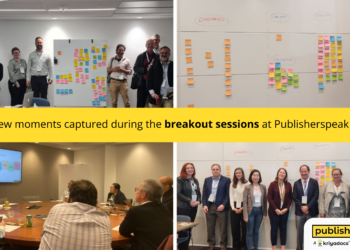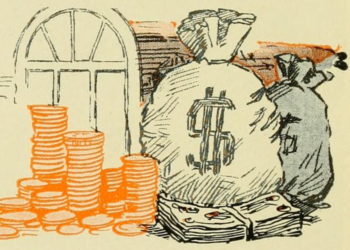 “Science is the Language of the intellect of Society. Art is the language of the entire Human personality.” This quote from Egypt’s Nobel prize-winning author, Naguib Mahfouz, from his Cairo Trilogy, is both moving and profound, with a distinctly Middle Eastern flavor. Mahfouz‘s books are published thanks to the American University in Cairo Press (AUC Press) (although licensed for sale in the West by a wide range of publishers). As North American university presses struggle with identity, and seek to redefine their place in the publishing ecosystem, I felt that it would be worth exploring the activities, and outlook of the AUC Press through the eyes of its Director, Nigel Fletcher Jones. What can we learn from this publisher, who has ambition, optimism, and a recent track record of significant growth?
“Science is the Language of the intellect of Society. Art is the language of the entire Human personality.” This quote from Egypt’s Nobel prize-winning author, Naguib Mahfouz, from his Cairo Trilogy, is both moving and profound, with a distinctly Middle Eastern flavor. Mahfouz‘s books are published thanks to the American University in Cairo Press (AUC Press) (although licensed for sale in the West by a wide range of publishers). As North American university presses struggle with identity, and seek to redefine their place in the publishing ecosystem, I felt that it would be worth exploring the activities, and outlook of the AUC Press through the eyes of its Director, Nigel Fletcher Jones. What can we learn from this publisher, who has ambition, optimism, and a recent track record of significant growth?
We started by discussing Nigel’s motivations and background. Nigel is not Egyptian — in fact, he is a funny, affable, and erudite Englishman. Nigel’s publishing background is quite international. Born and raised in England, he has a PhD in biological anthropology and a deep interest in all things archeological. His career, though, has been made in science journal publishing. He has worked at Cell Press and Elsevier, served as Publisher of the Nature research family of journals, and as Publishing Director of US Medical Publishing at Blackwell. He has worked in the UK, the Netherlands and the US.
I asked Nigel why he decided to take the position of Director at AUC Press in 2012. Nigel says that for him, leading the growth of AUC Press was a chance to build a significant book program in academic disciplines that are close to his heart. Nigel also has great ambitions for AUC Press. Nigel joined AUC Press shortly after the Egyptian revolution in 2011, part of the “Arab Spring”. He indicated that it was a tough decision to move to a part of the world that many at home perceive as unstable and dangerous, but the opportunities far outweighed the risks.
So what is AUC Press? Founded 55 years ago, they established themselves as a solid publisher of books on the Middle East. They publish (only in English) around 60 books per year, run six bookstores, have their own printing press and distribution warehouse, and maintain a staff of 65. Nigel himself reports to the President of AUC. According to Nigel, the AUC Press mission is unique among university presses. Their interests are directly aligned with that of the university, and in fact, AUC Press provides the main channel for communication by AUC globally. This is quite different to the situation of most American university presses who are more likely to be adjunct to the university – important, but separate – desired, but not essential.
Interestingly, the output of AUC press is quite diverse. Nigel talked about the close relationship of AUC Press and the great Middle Eastern novelists, including Mahfouz. The Press is the largest publisher of Arabic literature in translation. Academic research books in Egyptology and Middle Eastern Studies, however, make up the bedrock of the publishing program. Interestingly there are books solely designed for the teaching of Arabic in class, or self-teaching, and these are the most popular programs as far as sales in the U.S.
A third program is perhaps not exactly a lucrative option at present, but still important — books for tourists’ consumption on Egyptology that tap into the worldwide popular desire to know more about Ancient Egypt. In talking with Nigel, we both likened the Egyptology market to the rather more familiar paleontology market we see in the West with an interesting balance between the professionals, and the vast array of often extremely gifted amateurs.
Nigel pointed out that since he joined in 2012, sales for AUC Press titles have shifted from 85% being sold in Egypt, to 75% being sold overseas. Part of this is due to their embracing of ebooks. Nigel, perhaps unlike many of us in the U.S., adores Amazon. For Nigel, being able to reach a customer in, say, the midwest of the U.S., with an easy-to-download Kindle version of a book, has meant rapid growth.
At this point in our discussion, I decided to steer away from the role itself, to asking Nigel more about what it is like to live and work in Cairo. Let’s not forget that AUC Press is right there in Tahrir Square, the epicenter of Egypt’s revolutionary fervor. Nigel is warm in his affection for the Egyptian people. He says that Egypt is not a dangerous place for foreigners to visit, despite what one may hear in the media. It is true that Tahrir Square has seen violent protests: AUC Press has suffered the after effects of tear gas wafting through the office windows. They know more about what an armored personnel carrier looks like than most of us ever will. Back in 2011, before Nigel joined, the Press was actually invaded and ransacked by rioters. Despite all this, for Nigel, living and working in Egypt appears to be wonderful – a mix of personal warmth, cultural and historical delights and sheer beauty. I did laugh when, after I finished complaining about the six feet of snow hammering Boston in February, Nigel said, “I do not miss the snow, but then again, we have sand storms.”
So, what of AUC Press’s strategic outlook? Nigel sees significant publishing growth over the next few years. Where once many of their deals were licensing deals, now there is a robust acquisitions program, and there appear to be markets ready for their publishing output. It is refreshing to see such vibrancy and optimism in a university press leader.
In talking with Nigel, we circled back to AUC Press’s role as a communication vehicle for thought and policy in Egypt and the Middle East for a worldwide English language audience. Nigel is frustrated when he sees the BBC or CNN misrepresent what is happening in Egypt. He firmly believes that AUC Press will be able to shift public opinion by reflecting the realities of the region in their publications.
In talking about the future, Nigel was passionate about a role for AUC Press in direct marketing to their readers. Already active on Facebook, Nigel sees that establishing this direct connection with an audience tuned to Egyptology is a major way for AUC Press to generate what sounded to me like the building blocks of a membership society. Interestingly Nigel and I ended our conversation musing about whether this is the way forward for university presses in the U.S. Is it possible for university presses to build relationships with their author and reader bases, creating a kind of membership in their ability to pull fields together?
Talking to Nigel was a refreshing experience. I walked away with a sense of optimism about the future of university press book publishing as seen through Nigel’s experiences. Clearly, university presses in the U.S. need to define themselves more clearly against their competition. As institutions shift in priorities, libraries change in nature, and in some cases look to integrating with their institutional publishing operations, where should they look for strategic opportunity? Perhaps part of the answer lies in closer identification with their institution’s mission, and library activities. Perhaps it is in mimicking the role of a discipline specific society, building a loyal following of passionate readers. There is no doubt that out of university presses come some of our most celebrated books. Just look at the success of Thomas Piketty and his book Capital, in the 21st Century – a best seller for Harvard University Press, and winner of the American Association of Publishers R. R. Hawkins award for scholarly book of the year in 2014.
Discussion
5 Thoughts on "Walk Like an Egyptian: A Conversation with Nigel Fletcher Jones, Director of the American University in Cairo Press"
Reblogged this on NATURE UNFOLDING.
While Nigel Fletcher is to be commended for what he has accomplished at AUC Press, I have to wonder how many American university press directors will accept his claim about AUC Press’s being “unique” in having its mission so closely aligned with that of its parent university and its being so integral a part of the university. No doubt some presses can do a better job of aligning their interests with those of their university’s, but I’m sure that those presses especially that have strong regional publishing programs will dispute that they are marginal in the way claimed here.
What I was trying to get across is that AUC Press is the primary global – as opposed to regional or local – communication channel for AUC. We are very closely aligned to the teaching and research interests of the university, and, more generally, we aspire to accurately reflect what is happening in the Middle East from the Middle East. Around the globe, and taking into account all readers, scholarly and lay, it is probable that more people know of the core characteristics of AUC because of AUC Press than for any other single reason. That, I would suggest, is unique(-ish).
Maybe not unique, though. There is a famous story abut former Princeton president Robert Goheen visiting India and meeting a dignitary who asked him if Princeton had any connection with the famous Princeton University Press. In this case, the press was better known there than was the university!
Emphasis is important. It is not a question of American university presses being marginal. The point is how aligned a university press may be with their university’s mission. In the case of AUC Press, especially in terms of their being very important in AUC’s communications globally, there is a unique form of alignment.



